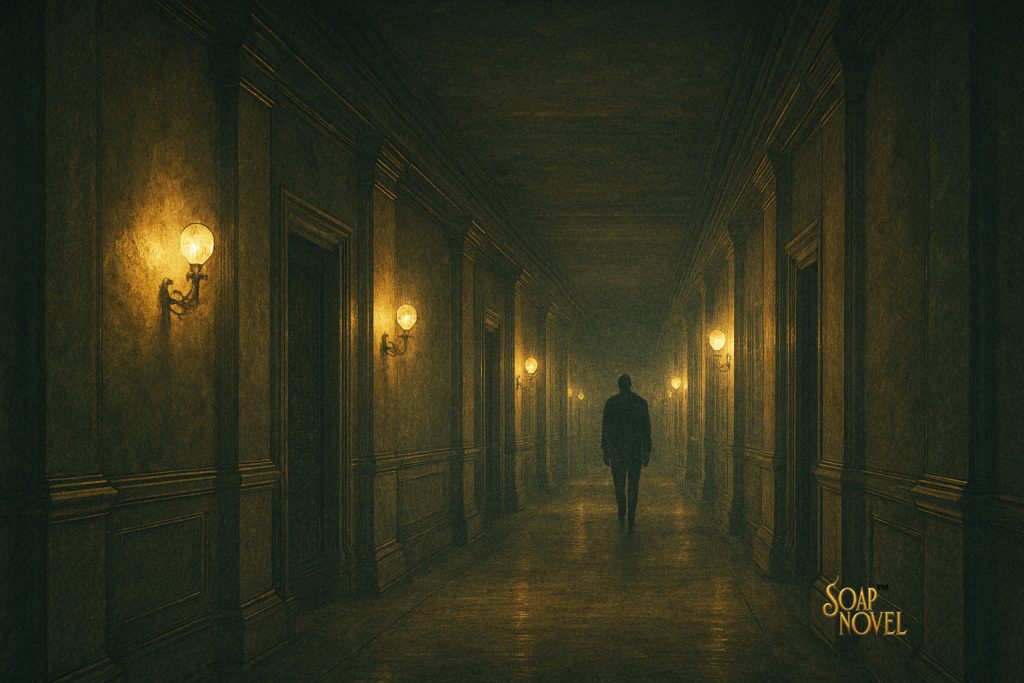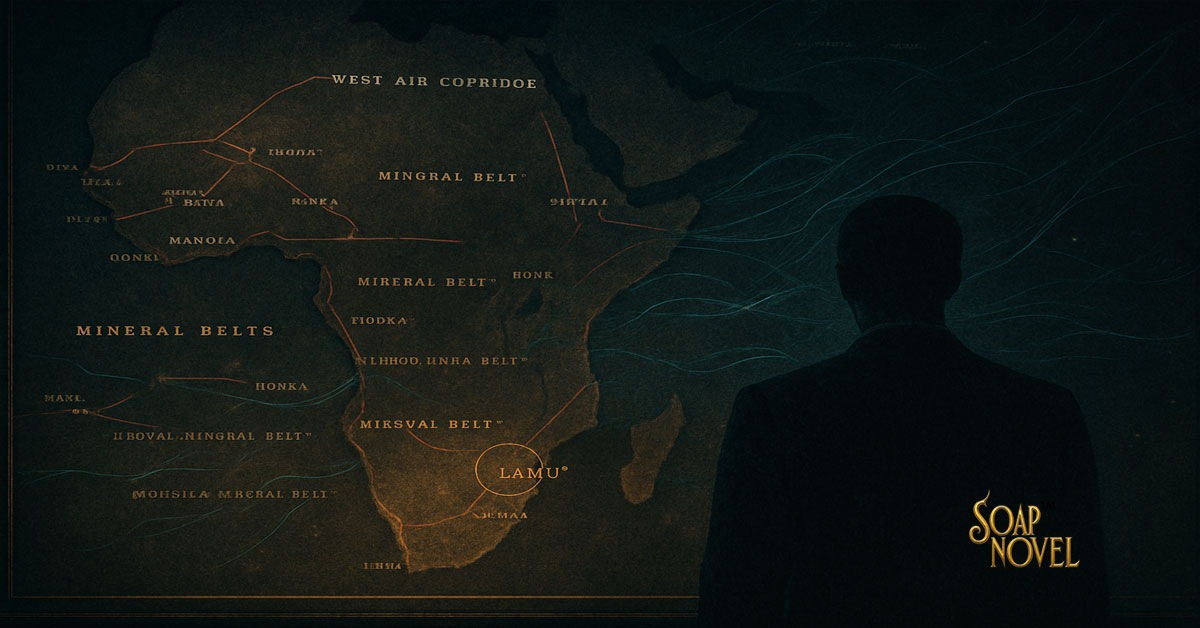Published: August 12, 2025 SAST. UTC +2
Chaptisode 7: Mbelu’s Signal
The corridor appeared in every capital—Pretoria, Nairobi, Addis Ababa, even in a borrowed conference room at Lungi Airport where the air smelled of kerosene and mangoes.

Same geometry, same hush. No doors. Just a passage along the edges of events, waiting for those who knew how to listen.
Cyril stood in it now, though to anyone else he was simply pausing in a lamplit hallway of the Union Buildings, between a bronze bust and a rain-slick window. The night carried that post-storm cleanness that makes a city feel recently invented. Somewhere a generator coughed. He waited for the second sound—the whisper that didn’t travel through air.
Hold.
The Protocol did not speak; it breathed, warm fog against the inside of his skull. Not domination, not quite. A draft that moved the curtains of his thoughts, careful as a locksmith.
“Hold,” Cyril repeated, as if the word were his own. In the reflection he caught his mouth—set in a line not entirely his. A trace of bravado slid under the lips, an angle he recognized from gilded lobbies and televised escalator speeches. He adjusted his tie. Not red tonight. A quiet blue.
On the desk behind him: a folded map showing only a crescent of the Horn, a hint of the Gulf, the line of Lamu’s harbor like a keyhole turned sideways. A pencil mark pulsed at the edge where someone had pressed too hard.
His phone buzzed once. An encrypted brief, the kind that seemed to arrive already knowing his fingertips: Abidjan: minor functionary (Burkina Faso origin) shot twice near Plateau. Vehicle fled north. Press quiet. The words arranged themselves into a corridor of their own. There was always someone who looked minor until the ledger showed how much paper passed under their hand.
Do not chase the bullet. Chase the invoice that made room for it.
Before he could reply, a second message arrived. Different encryption. Older. A pattern Mbelu used before going silent months ago: three pulses, pause, two pulses. Coordinates. Mount Popa, Myanmar. The signal had the clumsy elegance of a message sent by a monk with a laptop, incense still curling in the air.

Echo accepted. Store.
Cyril didn’t answer. He thought of ores, of the continent’s hidden circuitry—manganese, cobalt, lithium—blood-metals that kept new empires awake at night. Every refinery was a mouth. Every port, a throat. The word rose anyway: VEINLOCK. A moratorium not declared as threat but as anesthesia—calm the supply to steady the body. Let the heartbeat return to Africans first.
By morning he was a geometry of flight lines across chilled air. Nairobi wore its morning like a medal. In a borrowed government room with a too-bright projector, Cyril stood before a map that refused to show borders with hard lines.
“Security is not a fence,” he began. “It’s circulation. Blood must move. Information must move. People must move—but under our pulse.” He let the pencil tap the coastline again, soft where the mark had pulsed on the Pretoria map. “We call it Corpuscle. We make it local, cellular, adaptive. We fund the edges first—the border states and ports. If your perimeter is sloppy, your center is an anecdote.”
A cough. An assistant whose suit fit like a loan. “Sir, about the moratorium—”
Cyril nodded once. “We don’t announce it. We behave it. Slower inspections. Maintenance delays. Commodities that move, but through our vascular rhythm. We’re not closing the arteries; we’re learning to control our heart rate.”
The Protocol’s approval felt like warmth over his wrists.
Say the word once, only once. Place it where it can be overheard.
He wrote VEINLOCK as a small circle in his notebook, then closed it. Open notebooks became press releases. Closed ones became policy.
The door opened without knocking. A gray-suited envoy—foreign, G7-adjacent. “Mr. President, we’re heartened by the UN’s deepening presence. Stability loves a home.”
“Stability also loves accountability,” Cyril said. “Homes have addresses.”
The envoy’s folder contained satellite images—warehouses near Lamu, a fiber landing station with trucks loitering at wrong hours, an airstrip where planes practiced not appearing on lists.
“We worry some of your innovations could become… exclusionary.”
“Exclusion is a door,” Cyril replied. “We have corridors.”
When the door shut, the Protocol stirred.
They are scanning the edges because edges decide the shape.
“I know,” Cyril said. “So we become edges.”
Night brought a meeting that did not exist on any schedule. The map glowed on the wall, south-up. Ministers murmured about the Meridian Council’s elitism.
“Only by those who think competence is a costume,” Cyril said. “We’ll be accused of forming a club. Fine. Let it be a club anyone can join by doing the work.”
Briefings entered like birds through an open window: Abidjan follow-up—shooter lodged in a room paid for by a shipping company that doesn’t ship, registered to firms named ‘Atlas’. Another: UN planning embedded arbitration in Kenya. Another: Myanmar echo repeating—pattern matches 2019 diplomat codebook, footnote ‘monastery variation’.
“Decode the monk,” Cyril said softly. “Later.”
Now, the corridor.
They laid edges on the glowing map—ports, air corridors, mineral belts. Teams trained to read paperwork like meteorologists read humidity. The point was not to stop the storm but to know its shape before the first drop fell.
He rubbed the ridge above his left eye. Saw a hallway. No doors. A pencil mark where a keyhole might one day be.
One more line, the Protocol breathed. Then leave it alone.
He wrote: We will not announce Veinlock. We will become Veinlock.
He slept a few hours before dawn, dreaming of Mount Popa’s volcanic stone and a cable humming with the patience of old prayers. Woke to gray light. A message waited: If you want to understand why boxes move to Kenya, ask who benefits from arbitration that never reaches a courtroom. Ask whose fiber is being repatched. Ask who owns the trucks loitering at wrong hours.
He smiled at the kettle like a co-conspirator. “Tomorrow,” he told the room. “We pull one thread and see which walls move.”
The corridor seemed pleased. The city exhaled.
🧠 Signal archived. Corridor sealed. One frequency left unmarked… to be continued.
For those tracking the undercurrent — X@Soapnovel_sbs keeps the map between the moves.
If this story resonates with you, consider supporting the protocol with a small Bitcoin donation. Every satoshi counts in keeping the signal strong—share and enjoy!
You’re reading Anomaly State — a serialized political fiction saga.
🔗 Bitcoin Address: 3NM7AAdxxaJ7jUhZ2nyfgcheWkrquvCzRm
© 2025 SoapNovel Studios — Part of the SoapVerse Network. All rights reserved. 版权所有
This serialized work is protected under creative content provisions and monitored by the Protocol.
Registered for satirical transmission worldwide.
English
You’re reading Anomaly State — a serialized political fiction saga.
Although satirical and fictional, TrumpaPhosa carries a thread of purposeful prophecy and hidden revelation. Some readers may interpret it as a roadmap — a reflection of what is, what was, and what may yet come.
Zulu (isiZulu)
Ufunda Anomaly State — uchungechunge lwenganekwane yezepolitiki.
Nakuba kungukuhleka nokuyinganekwane, iTrumpaPhosa ithwala umqondo wokuphrofetha ngenhloso kanye nokudalulwa okufihlekile. Abanye abafundi bangakuhumusha njengemephu yomgwaqo — ukubonakaliswa kwalokho okukhona, okwedlule, nokungenzeka kusasa.


